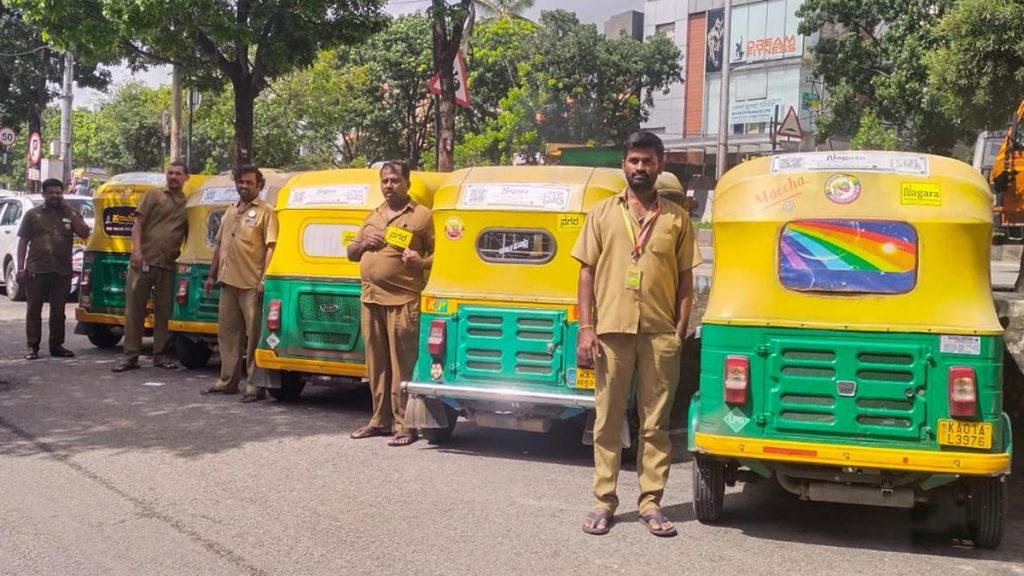
Currently, private entities own and operate ride-hailing applications, often retaining a significant portion of drivers’ earnings as commission. This has been a major point of contention among cab and auto drivers.
| Photo Credit: File photo
Karnataka’s cab drivers have expressed support for the Central Government’s decision to launch a cooperative ride-hailing service named ‘Sahkar Taxi’. The plan of the government of Karnataka to introduce its own app remains in limbo.
Union Home Minister and Minister of Cooperation Amit Shah recently revealed the government’s vision for a cooperative taxi service, stating that, in the near future, a system would be established wherein two-wheelers, taxis, auto-rickshaws, and four-wheelers could be registered. He further emphasised that the revenue generated would go directly to the drivers, unlike private aggregators that deduct a significant amount as commission.
Private ride-hailing apps under scrutiny
Currently, private entities own and operate ride-hailing applications, often retaining a significant portion of drivers’ earnings as commission. This has been a major point of contention among cab and auto drivers. Various unions have raised concerns about the substantial commission fees imposed by private aggregators, which they claim severely impact drivers’ earnings and financial stability.
The Centre’s proposed cooperative model aims to address these grievances. According to a statement released by the Ministry of Cooperation, the initiative seeks to establish a democratic structure where willing taxi drivers form a cooperative society and take charge of its operations. The goal is to ensure equitable distribution of profit among members while simultaneously improving their working conditions and overall earnings. Additionally, the initiative is expected to enhance service quality for customers.
‘Many government-backed projects fail due to inefficiency and poor execution’
Several cab drivers’ unions have welcomed the Central Government’s move, believing it could offer a more sustainable alternative to existing platforms.
“This cooperative model is a step in the right direction. We have been struggling with high commission rates for years, and a government-backed alternative can finally give us the financial freedom we need,” said C. Sampath, general secretary of Adarsha Auto and Taxi Drivers’ Union.
However, not all drivers are optimistic. Some cab drivers remain sceptical about the feasibility of the initiative.
“We have seen many government-backed projects fail due to inefficiency and poor execution. While the idea sounds promising, its success depends on how well it is implemented. If bureaucratic hurdles delay payments and bookings, it won’t be any different from existing problems,” said Tanveer Pasha, president of Ola Uber Drivers’ and Owners’ Association.
Karnataka’s delayed initiative
In 2023, the Transport Department of Karnataka announced a plan to develop a State-run taxi and autorickshaw booking platform, aiming to provide an alternative to private aggregators. This decision was made in response to mounting complaints from drivers and passengers about the exploitative practices of private ride-hailing companies.
The Transport Department formally requested the e-Governance Department to initiate development of the mobile application. However, no substantial progress has been made so far.
A senior official from the Transport Department claimed that the project failed to take off due to the extensive groundwork required.
“The development of such an application involves multiple technical and logistical challenges. Ensuring a seamless back-end operation, addressing legal complexities, and maintaining a reliable user interface are all crucial factors. Unfortunately, the project has not moved forward as expected,” the official said.
High commission fees remain a concern
Despite ongoing discussions and plans, the burden of high commission fees continues to plague both drivers and customers. Many drivers argue that the increasing operational costs and the substantial share deducted by private companies leave them with meagre earnings.
M. Manjunath, president of the Adarsha Auto and Taxi Drivers’ Union, highlighted the adverse impact of these commissions. “Before these private companies entered the market, there was a friendly connection between drivers and passengers,” he said. “Now, that trust has been eroded. These platforms charge customers ₹100 for a two-kilometre ride but pay drivers only ₹30. This is unfair to both parties. Neither passengers nor drivers should bear the brunt of such exploitative practices.”
In 2022, the Bengaluru Auto Drivers’ Unions and the Welfare Associations’ Federation, an umbrella body representing several driver unions, urged the Transport Department to take strict action against unregulated ride-hailing apps and illegal bike taxi services.
This gap in policy led to the emergence of Namma Yatri, a driver-centric ride-hailing app launched by the Auto Rickshaw Driver Union (ARDU). The app was built on the Open Network for Digital Commerce (ONDC) framework, and developed with the assistance of Juspay Technologies Private Limited.
Namma Yatri gained traction as an alternative platform, allowing drivers to connect directly with customers without paying hefty commissions to aggregators. However, it remains a relatively small player compared to the larger private companies dominating the sector.
Published – April 01, 2025 02:37 pm IST


